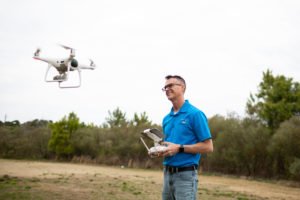DRONELIFE reported earlier on a lawsuit in North Carolina challenging the notion that drone mapping is surveying without a license. Here, members of the organization representing commercial drone operator Michael Jones lay out their case to protect his rights to sell aerial images.
The following is a guest post by Sam Gedge and Daryl James of the Institute for Justice in Arlington, Va. DRONELIFE neither accepts nor makes payments for guest posts.
Nobody tries to shut down Google when the tech giant takes aerial photographs and stitches them together seamlessly in Maps. But North Carolina regulators pounced on Goldsboro drone operator Michael Jones when he did something similar for his clients.
The North Carolina Board of Examiners for Engineers and Surveyors sent Jones a cease-and-desist letter in summer 2019, accusing him of violating state laws against the unlicensed practice of land surveying. The ancient profession—as old as property taxes—deals with the measurement and recording of real estate boundaries for legal purposes.
The allegations stunned Jones, who never did anything close to surveying. He just mounted cameras and other equipment onto drones, and used the technology to capture high-resolution images packed with information for his clients.
Sometimes he created multiple frames that fit together like a puzzle or grid, but he never purported to establish legal plot boundaries. His work was purely informational. “I never submitted anything official,” Jones says.
Google provides similar services when it labels landmarks and draws lines on interactive maps. So do Apple, MapQuest, Bing and Garmin. None of these activities establishes or changes property lines for legal purposes. Otherwise, North Carolina would be busy sending nasty letters to corporate headquarters all over the world.
If the state tried to silence Silicon Valley and other tech hubs, it would get a quick lesson in the First Amendment. Gathering, formatting and sharing information is speech—whether people use old typewriters or cutting-edge quadcopters. The Constitution protects the process regardless of the technology involved, even when someone sells the final product for money.
The U.S. Supreme Court recently confirmed the principle. “Speech is not unprotected merely because it is uttered by professionals,” and the government cannot claim “unfettered power to reduce a group’s First Amendment rights by simply imposing a licensing requirement,” the Court declared in 2018.
North Carolina board members missed the memo. Since 2018 they have issued around a half-dozen cease-and-desist letters to drone operators like Jones. Elsewhere, surveyors in California and Oregon have launched their own efforts to keep drones out of the sky.
Rather than stay grounded, Jones has partnered with the nonprofit Institute for Justice and sued the government. His lawsuit, filed March 22 in federal court, asserts his right to collect and share information—just like anyone else with a camera.
Some photographers shoot weddings. Others shoot nature, sports, fashion and news. Jones shoots rooftops using a remote camera 400 feet in the air. Artistic merit is irrelevant. The First Amendment guarantees the right to use words and graphics without a license.
Unfortunately, surveying boards sometimes care more about protecting industry insiders from competition than protecting civil rights. When they look up and see drones, they panic. Customers, who sometimes hire surveyors to draw maps and measure distances, now have alternatives that were unavailable just 10 or 20 years ago.
Drones not only can do many jobs faster than teams on the ground, but also cheaper. A single photographer can scan an entire construction site, so builders can monitor the progress of their work. The possibilities for other applications are endless.
Some people would call this progress. But some licensed surveyors see it as an invasion on their turf. In fact, one member of North Carolina’s surveying board mused publicly whether the agency’s recent spike in investigations represents a response to new, innovative technology services.
Essentially, the industry wants to criminalize this innovation rather than adapt. The Luddites tried something similar in the 1800s, when they destroyed textile machinery as a protest against change. More recently, taxi drivers have tried to block ride-hailing services like Uber and Lyft. And real estate agents have tried to shut down property listing sites like Zillow.
Tension is inevitable when new technology collides with old, but the Constitution remains constant. North Carolina’s surveying board should understand this. They mark boundaries for a living, but they cross a line when they try to silence speech.
Sam Gedge is an attorney and Daryl James is a writer at the Institute for Justice in Arlington, Va., which is representing Michael Jones and his business in their lawsuit against the North Carolina surveying board.
Miriam McNabb is the Editor-in-Chief of DRONELIFE and CEO of JobForDrones, a professional drone services marketplace, and a fascinated observer of the emerging drone industry and the regulatory environment for drones. Miriam has penned over 3,000 articles focused on the commercial drone space and is an international speaker and recognized figure in the industry. Miriam has a degree from the University of Chicago and over 20 years of experience in high tech sales and marketing for new technologies.
For drone industry consulting or writing, Email Miriam.
TWITTER:@spaldingbarker
Subscribe to DroneLife here.
